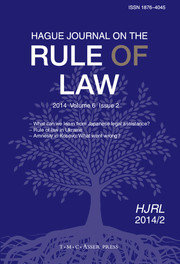Article contents
A Critical Assessment of Legal Identity: What It Promises and What It Delivers*
Published online by Cambridge University Press: 04 November 2013
Abstract
Universal provision of legal identity, most commonly birth registration, is viewed as both an intrinsic human right and an instrumental development necessity. Legal identity is commonly associated with citizen access to certain benefits and opportunities, protection of human rights, and generation of vital statistics to inform development planning. Research conducted in Nepal, Cambodia, and Bangladesh demonstrates that significant obstacles to obtaining legal identity include financial and procedural barriers, discriminatory laws and policies, institutional incapacity, and citizens' lack of knowledge and motivation. Robust alternative markets for legal identity reveal the true public demand for identity documents. In the developing country context, the provision of legal identity alone does not necessarily deliver desired development outcomes. Thus, universal civil registration is a necessary and worthy goal, but focus should remain on the ultimate development goals behind universal registration.
Information
- Type
- Articles
- Information
- Copyright
- Copyright © T.M.C. Asser Press and the Authors 2014
Footnotes
This paper was inspired by and based on research conducted in Bangladesh, Cambodia, and Nepal by The Asia Foundation with funding from the Asian Development Bank (ADB). The study was conducted with the help of Asia Foundation consultants and numerous focus group participants and key informants. A report of the original research was published by the ADB (Legal Identity for Inclusive Development, 2007). We thank Caroline Vandenabeele and the ADB for their assistance with the original research. The views expressed in this paper are not necessarily those of The Asia Foundation. First published online 4 November 2013.
References
* This paper was inspired by and based on research conducted in Bangladesh, Cambodia, and Nepal by The Asia Foundation with funding from the Asian Development Bank (ADB). The study was conducted with the help of Asia Foundation consultants and numerous focus group participants and key informants. A report of the original research was published by the ADB (Legal Identity for Inclusive Development, 2007). We thank Caroline Vandenabeele and the ADB for their assistance with the original research. The views expressed in this paper are not necessarily those of The Asia Foundation. First published online 4 November 2013.
- 3
- Cited by

